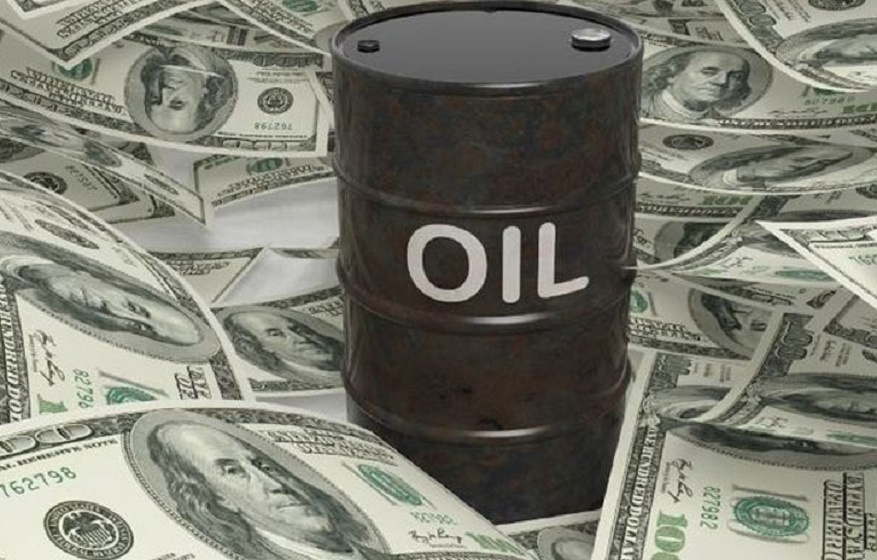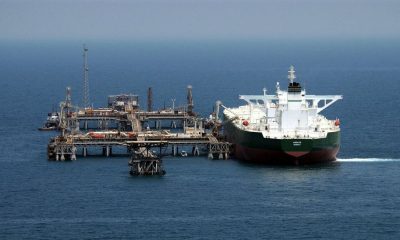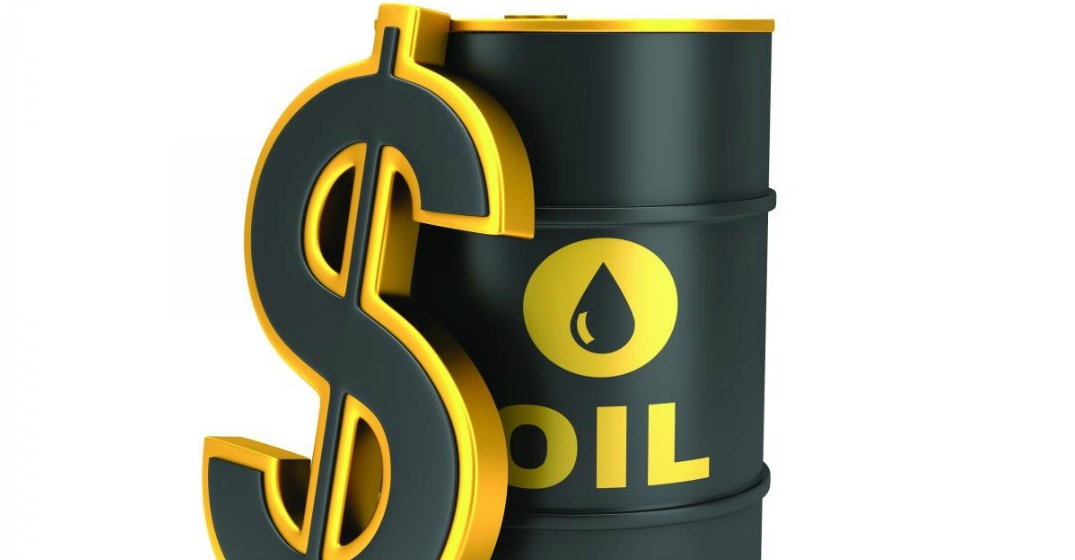Economy
Oil Trades Lower on Rise in Dollar, Ease in Weather Disruption

By Adedapo Adesanya
Oil closed lower on Tuesday as cooling expectations of interest rate cuts pushed the Dollar up while worries about weather disruption to production hubs in the United States waned.
Brent crude futures fell by 19 cents or 0.2 per cent to $77.96 a barrel and the US West Texas Intermediate (WTI) crude futures lost 56 cents or 0.8 per cent to settle at $72.12 per barrel. The US markets were closed for a public holiday on Monday.
The US Dollar hit a one-month high as investors reduced expectations of an interest rate cut by the US Federal Reserve in March.
The Dollar index, which tracks the greenback against a basket of currencies of other major trading currencies, was up 0.73 per cent at 103.38, after climbing as high as 103.42, its highest level since December 13.
The stronger greenback dented demand for Dollar-denominated oil among buyers using other currencies.
Severe weather conditions have cut oil production significantly in the American shale patch, with power outages, refinery shutdowns, and production stoppages taking hundreds of thousands of barrels offline.
However, forecasts for warm weather later in January in the major US production hubs also weighed on prices after meteorologists projected weather in the US. Lower 48 states would switch from colder than normal this week to mostly warmer than normal from January 22 – 31.
Prices drew support from signs of escalating tensions in the Middle East, as the US military carried out a new strike in Yemen against four Houthi anti-ship ballistic missiles. Houthi attacks on Red Sea shipping have been disrupting the global movement of goods through the key trading route.
The largest shipping and tanker industry groups advised on Friday members to stay away from the Bab el-Mandeb Strait while shippers were diverting transit away from the Red Sea en masse again but more than 100 ships, including oil tankers, have crossed the water lane since the warning to steer clear of the route.
Market analysts noted that the tensions in the Middle East are rising so the geopolitical risk premium in oil prices should be rising as well.
Concerns of the conflict spreading throughout the region grew on Tuesday, as Iran’s striking of targets in the semi-autonomous Kurdistan region of Iraq triggered a diplomatic dispute.
Iran also attacked Islamic State positions in Syria but despite the escalation, oil traders appear to be waiting for hard evidence of supply disruption before they push prices higher.
Economy
Cheap, Toxic Petroleum Products From Russia Flooding African Markets—Dangote
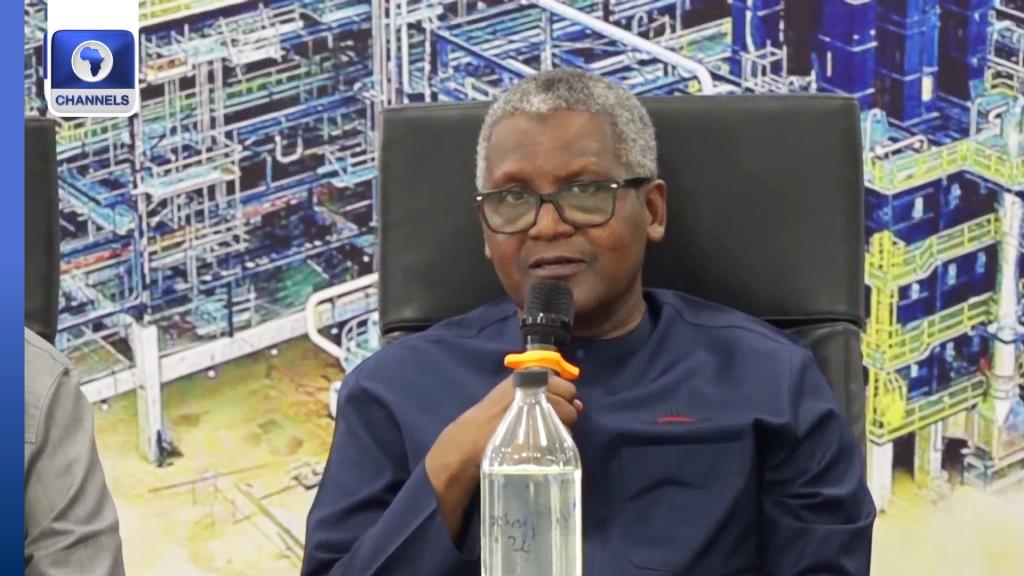
By Aduragbemi Omiyale
Foremost Nigerian businessman, Mr Aliko Dangote, has climbed to the rooftop to alert over the growing influx of discounted, low-quality fuel originating from Russia, blended with Russian crude under price caps and dumped in African markets.
He, therefore, called on African governments to follow the example of the United States, Canada, and the European Union, which have implemented protective measures for domestic refiners.
“We are now facing increasing dumping of cheap, often toxic, petroleum products—some of which are blended to substandard levels that would never be allowed in Europe or North America,” Mr Dangote lamented at the West African Refined Fuel Conference held in Abuja.
The crude oil refinery owner in Lagos said due to the continent’s limited domestic refining capacity, Africa imports over 120 million tonnes of refined petroleum products annually, at a cost of approximately $90 billion.
“As we speak today, we buy 9 – 10 million barrels of crude monthly from US and other countries. I must thank NNPC for making some cargoes of Nigerian crude available to us from start of production to date,” he disclosed at the event organised by the Nigerian Midstream and Downstream Petroleum Regulatory Authority (NMDPRA) and S&P Global Commodity Insights.
While appreciating the Nigerian National Petroleum Company (NNPC) Limited for making some cargoes of Nigerian crude available to his facility from start of production to date, he revealed that the company, monthly import between 9-10 million barrels of crude from the United States of America and other countries.
According to him, despite producing around 7 million barrels of crude oil per day, Africa only refines about 40% of its 4.3 million barrels daily consumption of refined products domestically. In stark contrast, Europe and Asia refine over 95 per cent of what they consume.
“So, while we produce plenty of crude, we still import over 120 million tonnes of refined petroleum products each year, effectively exporting jobs and importing poverty into our continent. That’s a $90 billion market opportunity being captured by regions with surplus refining capacity. To put this in perspective: only about 15 per cent of African countries have a GDP greater than $90 billion. We are effectively handing over an entire continent’s economic potential to others—year after year,” he said.
While reaffirming his belief in the power of free markets and international cooperation, Mr Dangote emphasised that trade must be grounded in economic efficiency and comparative advantage — not at the expense of quality or safety standards.
He stressed that, “it defies logic and economic sense for Africa to be exporting raw crude only to re-import refined products—products we are more than capable of producing ourselves, closer to both source and consumption.”
Reflecting on the experience of delivering the world’s largest single-train refinery, the industrialist also highlighted a range of challenges faced, including technical, commercial, and contextual hurdles unique to the African landscape.
Africa’s wealthiest man described building refineries such as the Dangote Petroleum Refinery as one of the most capital-intensive and logistically complex industrial facilities ever constructed. The Dangote refinery project, he said, required clearing 2,735 hectares of land (seven times the size of Victoria Island), of which 70 per cent was swampy, requiring the pumping of 65 million cubic metres of sand to stabilise the site and raise it by 1.5 metres, over 250,000 foundation piles, and millions of metres of piping, cabling, and electrical wiring among others.
“At peak, we had over 67,000 people on-site of which 50,000 are Nigerians, coordinating around the clock across hundreds of disciplines and nationalities. Then, of course, came the COVID-19 pandemic which set us back by two years and brought new levels of complexity, disruption, and risk. But we persevered,” he noted.
The refinery also required the construction of a dedicated seaport, as existing Nigerian ports could not handle the size and volume of equipment required. This included over 2,500 pieces of heavy equipment, 330 cranes, and even the establishment of the world’s largest granite quarry, with a production capacity of 10 million tonnes per year.
“In short, we didn’t just build a refinery—we built an entire industrial ecosystem from scratch,” he said.
Despite the refinery’s technical success, Dangote identified significant commercial challenges, particularly exchange rates which have gone from N156/$ at inception to N1,600/$ at completion, and challenges around crude oil sourcing. Although Nigeria is said to produce about 2 million barrels per day, the refinery has struggled to secure crude at competitive terms.
“Rather than buying crude oil directly from Nigerian producers at competitive terms, we found ourselves having to negotiate with international trading companies, who were buying Nigerian crude and reselling it to us—with hefty premiums, of course.
“Logistics and regulatory bottlenecks have also taken a toll. Port and regulatory charges reportedly account for 40 per cent of total freight costs, sometimes costing two-thirds as much as chartering the vessel itself.
“Refiners in India, who purchase crude oil from regions even farther away, enjoy lower freight costs than we do right here in West Africa because they are not saddled with exorbitant port charges,” Mr Dangote said.
He added that, in terms of port charges, it is currently more expensive to load a domestic cargo of petroleum products from the Dangote Refinery, as customers pay both at the point of loading and at the point of discharge. In contrast, when they load from Lomé, which competes with them, they pay only at the point of discharge.
Dangote further criticised the lack of harmonised fuel standards across African nations, which creates artificial barriers for regional trade in refined products.
“The fuel we produce for Nigeria cannot be sold in Cameroon or Ghana or Togo, even though we all drive the same vehicles. This lack of harmonisation benefits no one—except, of course, international traders, who thrive on arbitrage. For local refiners like us, it fragments the market and imposes unnecessary inefficiencies.”
Mr Dangote, stating the challenge with diesel production in Africa, noted, “To give one example, the diesel cloud point for Nigeria is 4 degrees. Without going into the technical details, this means that the diesel should work at a temperature of 4 degrees centigrade. Achieving this comes at a cost to us and limits the types of crude we could process. But how many places in Nigeria experience temperatures of 4 degrees? Other African countries have a more reasonable range of 7 to 12 degrees. This is a low hanging fruit which could be addressed by the regulators.”
Economy
OTC Securities Exchange Extends Positive Run by 0.24%

By Adedapo Adesanya
The positive run of the NASD Over-the-Counter (OTC) Securities Exchange stretched by 0.24 per cent on Thursday, July 24, with the platform’s market capitalisation growing by N5.07 billion to close at N2.116 trillion compared with the preceding day’s N2.111 trillion, and the NASD Unlisted Security Index (NSI) increasing by 8.66 points to settle at 3,614.75 points, in contrast to the 3,606.09 points it ended on Wednesday.
The activity log showed that the volume of transactions went down during the session by 39.3 per cent to 471,023 units from the 776,428 units transacted during the midweek session, just as the value of trades decreased by 34.8 per cent to N17.7 million from the N27.1 million achieved a day earlier, and the number of deals shrank by 11.8 per cent to 45 deals from the 51 deals carried out a day earlier.
Okitipupa Plc ended the day as the most traded stock by value on a year-to-date basis with 154.0 million units worth N4.9 billion, followed by Air Liquide Plc with 507.2 million units valued at N4.2 billion, and FrieslandCampina Wamco Nigeria Plc with 42.3 million units sold for N1.8 billion.
Also, Industrial and General Insurance (IGI) maintained its position as the most traded stock by volume on a year-to-date basis with 1.1 billion units traded for N354.4 million, trailed by Impresit Bakolori Plc with 536.9 million units sold for N524.8 million, and Air Liquide Plc with 507.2 million units valued at N4.2 billion.
The alternative stock exchange finished with four price gainers and one price decliner led by Food Concepts, which depleted by 15 Kobo to sell for N3.05 per unit compared with the preceding day’s N3.20 per unit.
However, NASD Plc which rose by N3.00 to N33.25 per share from N30.25 per share, FrieslandCampina Wamco Nigeria Plc gained N2.46 to end at N73.76 per unit versus midweek’s N71.30 per unit, Central Securities Clearing System Plc (CSCS) Plc appreciated by 40 Kobo to N47.43 per share from N47.03 per share, and AG Mortgage Bank Plc improved by 10 Kobo to N1.09 per unit from 99 Kobo per unit.
Economy
Fresh Optimism Firms Naira to N1,534/$1 at NAFEM, N1,536/$1 at Black Market
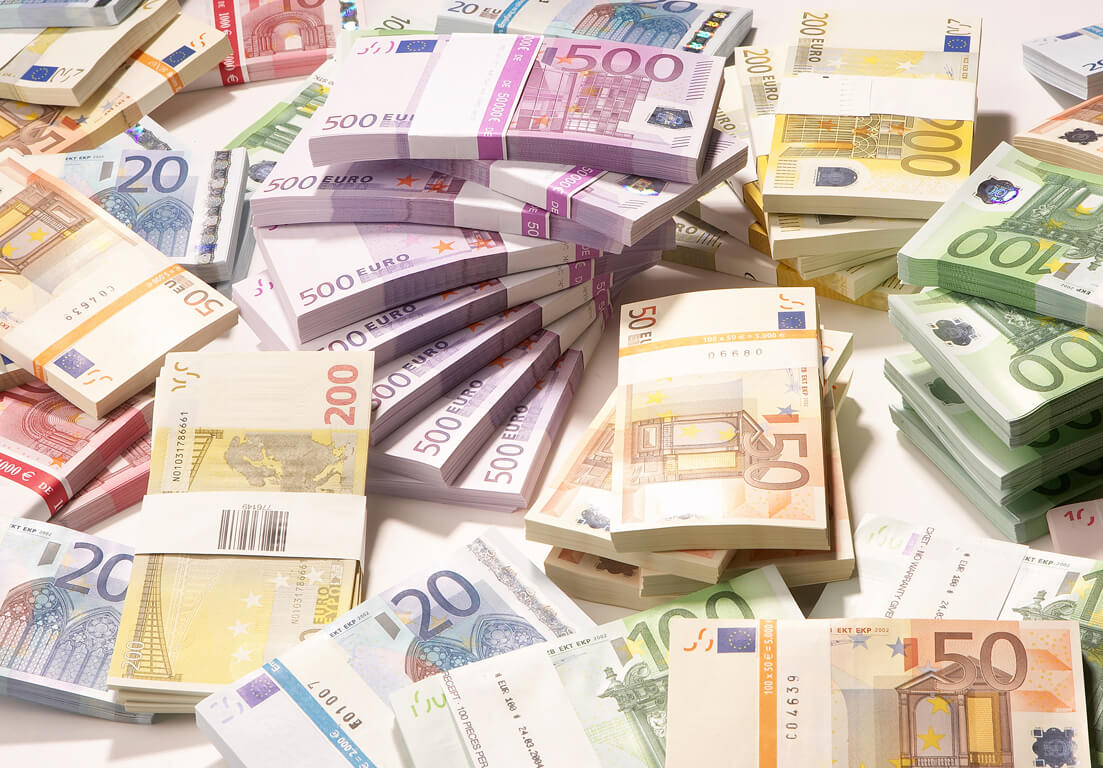
By Adedapo Adesanya
The recent pressure on the Nigerian Naira in the Nigerian Autonomous Foreign Exchange Market (NAFEM) segment of the FX market eased on Thursday after six consecutive days of losses.
At the spot market yesterday, the local currency improved its value against the US Dollar by 0.08 per cent or N1.16 to sell for N1,534.88/$1, in contrast to the N1,536.04/$1 it was sold on Wednesday.
Also, the Naira appreciated against the Pound Sterling in the official market during the trading session by N2.66 to close at N2,079.18/£1 compared with the preceding session’s N2,081.84/£1 but lost N4.86 against the Euro to finish at N1,807.06/€1 compared with midweek’s value of N1,802.20/€1.
In the black market window, the Naira gained N1 against the greenback on Thursday to quote at N1,536/$1 versus the N1,537/$1 it was exchanged a day earlier.
Renewed optimism in the forex market contributed to the positive performance put up by the Nigerian currency yesterday, with analysts hinging this on improved foreign exchange inflows from sustained government reforms, higher global oil prices, and a weaker US Dollar.
The Central Bank of Nigeria (CBN) also claims confidence in the Naira is growing among Nigerians, reflecting renewed optimism over ongoing reforms and improvements in macroeconomic stability.
A new projection by Comercio Partners says the Naira could appreciate to N1,400 per Dollar in the coming months, adding that the base-case scenario could see the rate at N1,500/$1 to N1,600/$1 band, consistent with its current range on the back of steady FX inflows, oil earnings, and CBN intervention efforts.
A look at the digital currency market revealed continued correction among some of the top benchmarked assets led by Dogecoin (DOGE), which slumped by 3.6 per cent to sell at $0.2274.
Further, Solana (SOL) lost 3.5 per cent to close at $178.99, Bitcoin (BTC) gave up 2.0 per cent to end at $115,580.12, Litecoin (LTC) shed 0.6 per cent to finish at $110.20, Ripple (XRP) plunged by 0.4 per cent to $3.08, and Binance Coin (BNB) depreciated by 0.2 per cent to $762.11.
But, Ethereum (ETH) grew by 0.9 per cent to $3,629.15, and Cardano (ADA) increased by 0.5 per cent to $0.8008, while the US Dollar Tether (USDT) and the US Dollar Coin (USDC) traded flat at $1.00 apiece.
-

 Feature/OPED5 years ago
Feature/OPED5 years agoDavos was Different this year
-
Travel/Tourism9 years ago
Lagos Seals Western Lodge Hotel In Ikorodu
-

 Showbiz3 years ago
Showbiz3 years agoEstranged Lover Releases Videos of Empress Njamah Bathing
-

 Banking7 years ago
Banking7 years agoSort Codes of GTBank Branches in Nigeria
-

 Economy2 years ago
Economy2 years agoSubsidy Removal: CNG at N130 Per Litre Cheaper Than Petrol—IPMAN
-

 Banking2 years ago
Banking2 years agoFirst Bank Announces Planned Downtime
-

 Sports2 years ago
Sports2 years agoHighest Paid Nigerian Footballer – How Much Do Nigerian Footballers Earn
-

 Technology5 years ago
Technology5 years agoHow To Link Your MTN, Airtel, Glo, 9mobile Lines to NIN




